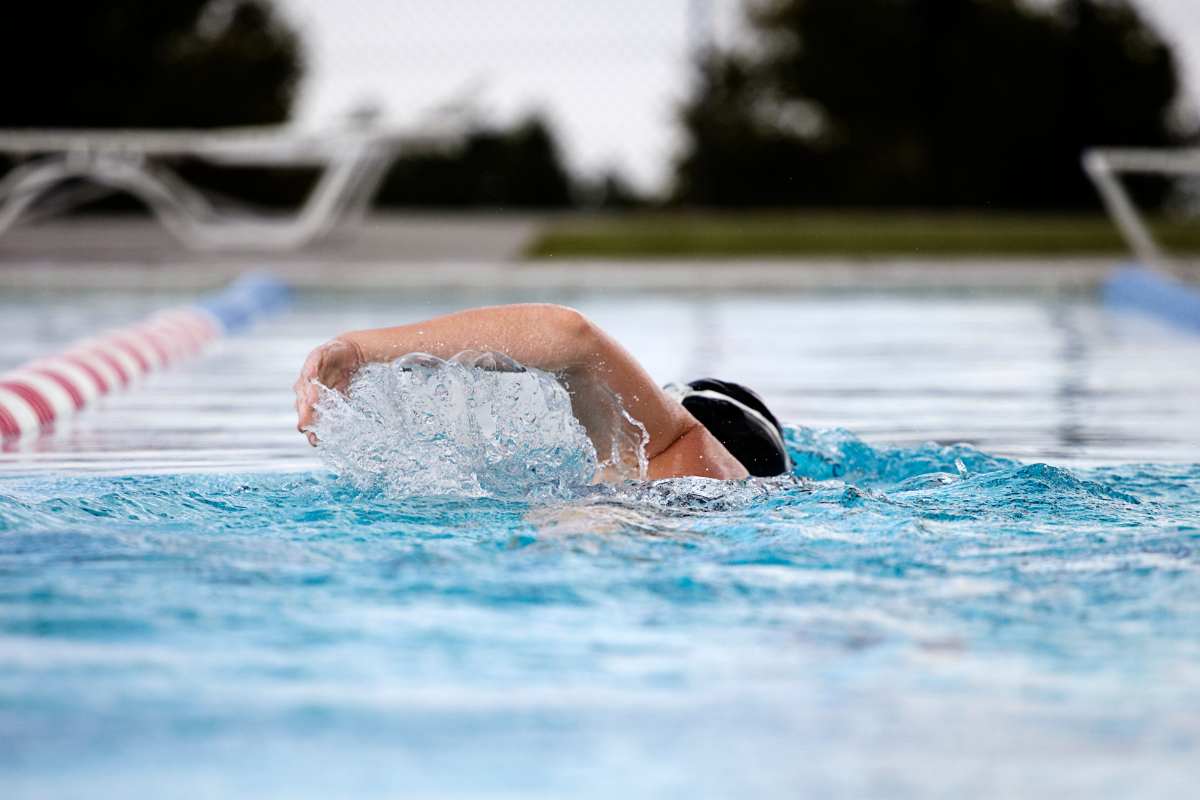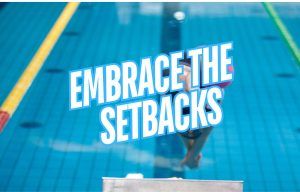Feeling stuck with your journaling? Here are some journaling prompts for swimmers to build self-awareness, confidence, and help swimmers maintain perspective over the course of the swim season.
Journaling is one of the best tools a swimmer has for managing the swings of confidence over the course of the season.
A swim season is difficult; the ups, the downs, and the long stretches of training, waiting patiently for those sometimes-minute bursts of improvement.
Journaling and tracking your swim workouts are an excellent way to help maintain perspective through the long slogs of training, after a bad swim practice, and as a way to celebrate those confidence-boosting moments of progress in training and competition.
But for swimmers who struggle with what to write in a journal, putting pen to paper can feel intimidating.
Where to start? What should I write about?
That’s where some journal prompts can step in.
They serve as a starting block, sparking creativity and giving swimmers a launching-off point for their journaling.
Additionally, journal prompts are great for swimmers who tend to focus on the same topics or issues over and over again when journaling, which can make things stale and can even be counter-productive.
Below is a list of twenty-one journaling prompts that will test your creativity, encourage you to maximize your performance in the water, and give you perspective to maintain commitment over the course of the swim season.
Let’s dive in.
Journaling Prompts for Swimmers
Here are journaling prompts for swimmers that will encourage greater self-reflection and awareness:
- Reflect on your discipline as a swimmer. Are you as disciplined as you would like? If not, what stops you from being disciplined?
- When you find yourself “wasting time,” do you feel guilty, or do you enjoy it? How can you make better use of your time?
- Write about a specific time when you used discipline to achieve a desired result in your swimming career. What was the outcome, and how did it make you feel?
- Do you believe it’s better to push as hard as possible until you finish a task or to space out periodic breaks while working to avoid exhaustion? How can you apply this approach to your training?
- How important is punctuality in your swimming journey? What are reasonable excuses for being late to practice or competitions?
- If you were to do a stand-up comedy routine, what swimming-related topics would you discuss? Would you enjoy being on stage as a swimmer?
- If you could go back and repeat a day of training or competition, knowing everything that happened, what would you do differently to improve your performance?
- Reflect on your swimming career and whether your name suits you. Does your name hold any significance or meaning in your journey?
- Imagine explaining the sport of swimming to someone who has never seen it. What are the most appealing aspects of swimming, both as a participant and spectator?
- What is the most interesting or surprising thing about you as a competitive swimmer that most people don’t know? How does this uniqueness contribute to your confidence?
- If you could give advice to your younger self as a swimmer, what would you say? How would this advice benefit your current self?
- List five things you love about yourself as a swimmer, both physically and mentally. How do these qualities boost your self-confidence?
- What fears or insecurities do you have as a competitive swimmer, and why? How can you work on overcoming them?
- Reflect on any negative thoughts or self-doubt you’ve experienced in your swimming journey. How can you change these thoughts into more positive and constructive ones?
- Write about a time when you felt jealous of another swimmer, or when someone was jealous of your achievements. What happened, and what could have been done differently?
- Describe non-verbal ways in which you express confidence in and out of the pool. How can you use these cues to build your self-assuredness?
- Share an experience when you received unexpected praise or encouragement about your swimming. How did it make you feel, and how did it impact your confidence?
- When you’ve been distracted during training or competitions in the past, what strategies have helped you regain focus and stay on track?
- Consider the role of a cheering crowd during your swim meets. Is it more encouraging or distracting for you as an athlete? How do you manage this external energy?
- Take a moment to observe your surroundings using all your senses. Write for at least 15 minutes, describing your environment in detail. How can this exercise enhance your focus and mindfulness in swimming?
- Reflect on the qualities of a great leader in the context of your swimming team. What characteristics make a great leader, and how can you work on developing these qualities in yourself as a teammate and athlete?
Benefits of Journaling for Swimmers
Swimmers can benefit from journaling in a variety of ways, including:
Self-reflection. Journaling allows swimmers to reflect on their training and competition experiences, helping them to identify strengths, weaknesses, and areas for improvement.
Self-coaching. Using a journal and logbook is a tool for “self-coaching,” where you can evaluate how you did in the water and assess your performance.
Goal setting. Journaling is perfect for writing out goals and aspirations in the water. Whether it’s the big end-of-season goal or training goals, journaling clarifies your objectives in the pool.
Mental toughness. Using a journal is beneficial for managing stress, anxiety, and self-doubt. There’s some research that shows journaling can produce “positive nervousness,” helping clarify anxieties and fears and giving them much-needed perspective.
Confidence. Journaling is a tool for logging your accomplishments over the course of the swim season. Accumulating and recognizing your wins is crucial to build legitimate confidence for when it matters most.
Training analysis. A training journal allows swimmers to record swim workouts, technical information, results, stroke rates, and other crucial performance metrics. These can be incredibly valuable for both swimmers and coaches in the pursuit of excellence.
Overall, journaling is a killer tool for helping swimmers enhance self-awareness, optimize performance, and improve their mental skills in the water.
How Swimmers Can Start Journaling
Swimmers can start journaling in just 5-10 minutes per day. The good news is that this strategy doesn’t take much time and can be an excellent way to unwind at the end of the day.
Here are some tips to help swimmers get started with journaling:
Make it part of your routine. Choose a specific time or part of your day to journal. Whether it’s as part of your “powering down” routine before you go to bed, part of your “powering up” routine when you wake up, or once you get home from swim practice, having a set schedule to journal makes it easier to turn into a habit.
Keep it accessible. It seems obvious, but a new habit should be easy and accessible. When we have a journal that is easily accessible, we are more likely to use it regularly. Whether it’s a physical notebook or an app on your smartphone, make your journal accessible.
Use prompts. If you find it challenging to come up with what to write, use prompts like the ones provided earlier. Prompts can spark ideas and keep your journaling focused on areas of your swimming journey that are most important to you.
Start small. For newbies, journaling can feel overwhelming. To combat writer’s block or mental paralysis, write short journal entries. Even just a few quick sentences of bullet point list can help you get started.
Have a “first draft” mentality. Anytime I am stuck about what to write, I think about it being a “first draft.” Ultimately, no one else needs to write your words, so don’t overthink perfect grammar or the perfect words. Just get it out.
Journaling is a highly personal practice, so there is no “perfect” way to do it. The key is to make it a regular part of your routine and stick with it for long enough to learn what works best for you.
Conclusion
Ultimately, this list of journal prompts for swimmers is a jumping-off point for you.
While not exhaustive, they provide the beginnings of a roadmap for self-discovery, self-awareness, and faster swimming in the pool.
Journaling isn’t just about recording experiences or logging times; it’s about shaping your swimming future and becoming the best version of yourself in and out of the pool.
Grab a pen, take a couple of the journaling prompts for a lap, and journey to greatness in the pages of your journal.
More Articles Like This
How to Get Into the Habit of Writing Out Your Swim Practices. Logging your swim workouts is one of the classic ways to get more from your swimming. Here are some proven tips for getting into the habit of writing out your swim workouts in a logbook.
Why You Should Be Grading Your Effort After Practice. One of my favorite ways to stay consistent and accountable in practice is this simple technique. Takes about three seconds, and will keep you honest about the effort in the water.














